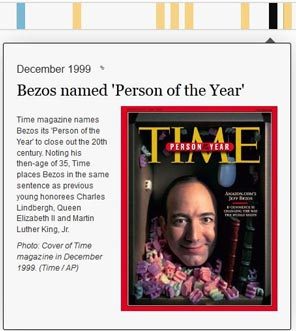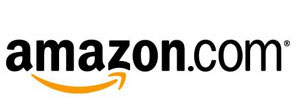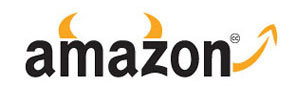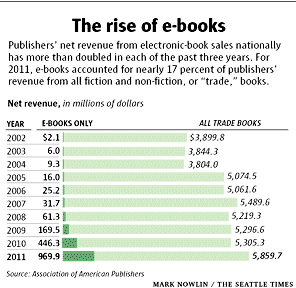Originally published April 1, 2012 at 10:30 PM | Page modified April 2, 2012 at 11:13 AM
Amazon.com trying to wring deep discounts from publishers
Amazon.com, the company that changed the way people buy books more than a decade ago, now appears poised to rewrite the rules of publishing.
Seattle Times business reporter
TOMMY PENICK
Karl-Heinz Roseman says Amazon has sent emails demanding a steep price break from McFarland & Co. Months later, he still has not been able to talk to a live Amazon employee.
TOMMY PENICK
John Smith, a bookmaker at McFarland & Co., talks on the phone while trying to solve a printing issue last month in Jefferson, N.C. Most of McFarland's printing is done by third-party printers, but some smaller-run paperbacks are produced on-site. The 55-employee firm publishes nearly 400 titles a year, mostly aimed at a small audience.
TOMMY PENICK
President Robert Franklin sits in the lobby of McFarland & Co. while searching a Russian dictionary. He was checking the translation for a book about chess, one of McFarland's publishing specialties and one of his passions.
Poll
Timeline: How the fortunes of Amazon and Jeff Bezos have grown

Click on the image above to explore a timeline about Amazon and its founder, Jeff Bezos.
Part 1: Behind the smile in Seattle
Part 2: A hammer on the publishers
Part 3: Pushing back on sales taxes
Part 4: Worked over in the warehouse
From the editor
Amazon logo and parody logo


Nothing speaks to the escalating tensions more plainly than a parody Amazon logo circulated among publishers. Pull the slider to the right to see Amazon's logo, and to the left to see the parody version.
![]()
The bad news came to McFarland & Co. in an email from Amazon.com. The world's largest Internet retailer wanted better wholesale terms for the small publisher's books. Starting Jan. 1, 2012 — then only 19 days away — Amazon would buy the publisher's books at 45 percent off the cover price, roughly double its current price break.
For McFarland, an independent publisher of scholarly books situated in the mountains of North Carolina, Amazon's email presented a money-losing proposition.
"It was the apocalypse," said Karl-Heinz Roseman, director of sales and marketing at McFarland, which has a long track record of giving all its retail partners the same discount.
McFarland and Amazon have shared a mutually beneficial relationship for more than a decade. A well-regarded source of books on baseball and chess, McFarland helped Amazon fulfill its mission of offering "Earth's biggest selection." And Amazon — in contrast to traditional bookstores — listed all of McFarland's titles, no matter how arcane.
Last year, Amazon generated nearly 70 percent of McFarland's retail sales and 15 percent of its entire business.
"If we made a change for Amazon, we'd have to do it for everyone, and that would jeopardize our business," Roseman said. "We couldn't exist like that."
Now, McFarland and others in the book world worry that Amazon will use its pricing pressure to crush publishers. They say Amazon's demands for deeper discounts threaten already-thin profit margins, and some warn about an Amazon monopoly.
Amazon, which declined to answer questions or discuss its relations with publishers for this story, dominates the U.S. market for print books sold online and also leads the market for electronic books. At the same time, it's working to become a big-name publisher in its own right.
Although publishers rarely criticize companies they do business with, some say they're speaking out against Amazon partly because they're offended by its tactics. They describe Amazon's demands — made in email, with no personal-contact information provided — as overly aggressive and leaving almost no room for discussion.
"The thing that has really aggravated me is the one-sided nature and anonymity of their business negotiations," said Karen Christensen, CEO of Berkshire Publishing Group, a Massachusetts-based independent publisher of professional and academic books. "They're trying to dictate terms to their suppliers without seeing it as something where there are two parties involved."
Amazon, which buys her books at 40 percent off the cover price, emailed her in December to demand an even bigger discount. She refused, and Amazon stopped placing orders, affecting 10 percent of her business.
While it's not clear how many publishers have received similar demands, Amy Rhodes, a partner at New York trade-publishing consultancy Market Partners International, said, "We have to assume they're looking for deeper discounts from everybody."
Standoff with publishers
Nothing speaks to the escalating tensions more plainly than a parody Amazon logo circulated among publishers. A pair of yellow horns adorns the top of Amazon's name, and its trademark smile, moved to the end of the "z," rather than underneath, looks like a devil's tail.
To some, Amazon's hardball tactics are reminiscent of its much-publicized pricing row two years ago with Macmillan, one of the nation's largest publishers.
In early 2010, Amazon removed the "buy" buttons from Macmillan's titles after the publisher sought to take pricing control of e-books away from the retailer. Amazon soon relented, saying it had no other choice but to cede control because Macmillan "has a monopoly over their own titles."
This February, Amazon again asserted its influence when it pulled nearly 5,000 titles by distributor Independent Publishers Group from its Kindle e-book store. Amazon wanted better terms, and IPG said "no."
Other online retailers, including Barnes & Noble and Apple, continue to sell digital versions of IPG's titles, enabling the distributor to resist Amazon's demands.
"They want more margin than what is reasonable to give," IPG President Mark Suchomel said. "At some point, enough is enough. What we and our publishers do to bring a book to market is so much riskier than what Amazon does to bring it to the reader."
McFarland, the North Carolina publisher, reports that Amazon continues to place book orders at its "standard" terms.
"If that changed, we'd simply not fill their orders and insist they get our books from a third-party wholesaler," Roseman said.
He and Amazon have been at loggerheads since Dec. 13, when the company's "Advantage Business Team" sent an email stating that an internal audit had revealed an "error" in McFarland's wholesale terms. Roseman wrote Amazon the next day to dispute the "error," but after nearly two dozen Web exchanges over two months, his efforts to resolve the issue proved futile.
In his last response to the "Advantage Business Team," Roseman pleaded for more transparency.
"Please share your name and your title. How long have you been employed by Amazon? And of that time, how long have you been on the Advantage business team?"
Roseman, who still hopes to speak with an Amazon employee, says the emails have left a bad taste in his mouth.
"It's like they're saying, 'You're too small and unimportant for us to have someone talk to you.' "
Amazon as publisher
Amazon, which changed the way people buy books more than a decade ago, now appears poised to rewrite the rules of publishing.
In 2009, Amazon launched its first imprint, AmazonEncore, publishing overlooked books and authors. Since then, Amazon has introduced a collection of imprints devoted to niche genres, including some named after its hometown, such as Thomas & Mercer (South Lake Union), Montlake Romance and 47North (Seattle's latitude).
Last year, it hired a former CEO of Time Warner Book Group to set up a New York office and publish general-interest books. Authors Deepak Chopra, James Franco and Penny Marshall are among Amazon's high-profile signings.
"There's never been anything like the potential for domination by a single company in the U.S. book business like what we see now with Amazon," said Mike Shatzkin, founder and CEO of The Idea Logical, a New York publishing consultancy.
Shatzkin estimates that Amazon accounts for 20 to 25 percent of all U.S. book sales. On the Internet alone, Amazon generates at least 75 percent of print-book sales and up to 60 percent of e-book sales, according to Shatzkin's estimates. (Because Amazon does not disclose book sales separate from its other "media" revenue, exact figures are unavailable.)
In the past, Amazon executives have downplayed the company's threat to traditional publishers.
"What we're building is more like an in-house laboratory where authors and editors and marketers can test new ideas," Jeff Belle, vice president of Amazon Publishing, said in a recent Businessweek article. "Success to us means working with authors who want to find new ways to connect with more readers."
For Paul Alexander, a writer living in New York, Amazon offers a welcome alternative to the old way of doing things.
Alexander wrote a 9,500-word story called "Murdered" last year and had it published as a Kindle "Single," a short-form e-book. Priced at $1.99, "Murdered" enjoyed a four-week run as Amazon's top-selling Single. The true-crime story continues to generate royalties for Alexander, who figures he has taken in about $50,000 from the mini e-book — more than if he had written it for a major magazine.
And with more leeway on word count, Alexander said, "It gave me a freedom I didn't have before."
Rosetta Books, his New York-based publisher, has helped produce eight Kindle Singles since Amazon launched the program in January 2011. Rosetta CEO Arthur Klebanoff says it's a good way for writers to get noticed.
"There's very heavy visibility, so if the author has other books, there's a lot of cross-promotional benefits," he said.
Selling at a loss
While Amazon's discounting long has made it the go-to place for many book buyers, critics argue that the strategy prevents competition and devalues books.
In November 2007, at a news conference to introduce Amazon's Kindle e-reading device, Chief Executive Jeff Bezos revealed that Amazon would sell newly released e-books for $9.99, below the wholesale price.
"When you sell books at a loss, by the millions, to corner the market, you're not interested in competing," said novelist Richard Russo, a Pulitzer Prize-winning novelist. "You're interested in burying your competitors and then burying the shovel."
E-books, by far, are the fastest-growing part of the publishing business. Overall spending on e-books is projected to reach $4.5 billion in 2012, up from $64.6 million in 2008, according to Forrester Research.
Shatzkin estimates that Barnes & Noble controls between 25 and 30 percent of U.S. e-book sales, while Apple accounts for 10 to 15 percent. Amazon, by contrast, probably has between 55 and 60 percent of the market, he said.
"Publishers are doing what they can to ensure that Amazon doesn't become to e-books what Apple became to music downloads," said digital-media consultant Bill Rosenblatt. "Otherwise, Amazon can call the shots."
Two years ago, as Apple prepared to launch its iPad tablet computer, a Kindle rival, it negotiated a new e-book pricing model with publishers. Instead of the wholesale model, by which publishers sold e-books to retailers at a set cost, and then retailers charged whatever they wanted for them, a handful of the largest publishers moved to an "agency" model with Apple.
The new model meant publishers would set prices for e-books through Apple's iBookstore, while Apple took a 30 percent cut of the sales proceeds. Amazon soon was forced to follow suit.
The U.S. Justice Department now is considering suing Apple and the five publishers — Simon & Schuster, Hachette, Penguin, Macmillan and HarperCollins — on charges they worked together to raise e-book prices.
That those companies are under investigation for price fixing doesn't diminish claims of an Amazon monopoly, said antitrust expert Michael Carrier, of the Rutgers School of Law in Camden, N.J.
Carrier believes Amazon is close to gaining monopoly power in the digital-book market. A company generally is determined to have such power when its market share exceeds 70 percent, he said. The question then becomes whether or not it engages in predatory activity.
"If they offer better products and can legitimately sell books better than their competitors, that would not necessarily be a violation of antitrust laws," Carrier said.
"If, on the other hand, Amazon is willing to lose profits to set e-book prices below what it's paying publishers, and that doesn't make any sense other than to ensure nobody else can compete, it could be a monopolist."
One recent development seems to have galvanized Amazon critics.
Just before Christmas, Amazon offered customers a 5 percent credit, or up to $5 off, when they used the company's price-check app to scan a product in competitors' stores and buy it online from Amazon. Although books were excluded, the credit could be used to buy other things sold at bookstores, such as music and DVDs.
In an opinion piece for The New York Times, Russo said the promotion was an attack on the kinds of bookstores that supported him long before he developed a large following. Recalling his first book tour, Russo fondly described how employees at one Chicago store "optimistically set up seven folding chairs, then occupied those chairs themselves when nobody showed up for the reading."
Book world leery
Critics point to Amazon's origins as evidence that the company never had the book world's best interests at heart.
In 1994, Bezos gave up his lucrative job at a New York City hedge fund to become an Internet entrepreneur. He started Amazon to sell books after making a list of 20 products suited to the Internet.
"I chose books for lots of different reasons, but one primary reason, and that is that there are more items in the book space than there are items in any other category, by far," he said in a 1998 speech at Lake Forest College in Illinois.
"When you have this huge catalog of products, you can build something online you just can't build any other way."
Today, Amazon sells millions of products across dozens of categories, from auto parts to groceries to cloud-computing power for other businesses. Its Kindle Fire tablet computer, which Bezos unveiled last year in New York, is seen as another way to hook customers on Amazon's website and digital-media content.
"Amazon can practically give books away to get customers, and then it can make money on them by selling them potato chips and computers," said Shatzkin, the publishing consultant. "There's nobody in the book business that can compete with that."
Borders, once the nation's second-largest bookstore chain, went out of business last year, and Barnes & Noble, the largest bookstore chain, is staking much of its future on the Nook.
In February, Barnes & Noble said quarterly sales of its Nook e-reader and digital catalog surged 38 percent from a year ago, while traditional book sales rose only 4 percent.
Amazon's tensions with the book world remind e-commerce analyst Sucharita Mulpuru of its fallout with former business partner Toys R Us some years ago.
In 2004, the New Jersey retailer filed a lawsuit accusing Amazon of violating an agreement that gave Toys R Us exclusive rights to sell toys, games and baby products on Amazon's site. Amazon, which let other third-party merchants sell similar products, fought back by saying Toys R Us failed to keep crucial items in stock.
After five years — and a sharply worded judge's decision in favor of Toys R Us — Amazon settled the suit for $51 million.
"They alienated their partner — in this case, Toys R Us — in the hope that they could get away with it," said Mulpuru, of Forrester Research in Cambridge, Mass. "The same thing is happening now with publishers."
Robert Franklin, who founded McFarland as a library-oriented publisher in 1979 and remains its president, describes Amazon's new terms as a financial non-starter. His 55-employee firm publishes nearly 400 titles a year — reference books, monographs and other serious works — mostly for a small audience.
"When you have a book that your gut tells you is going to sell 400 or 500 copies, you don't have any room to move on pricing. You're already cut to the bone," Franklin said.
"Surely, people can realize that what's good for one company may not be workable for another."
Seattle Times staff researcher David Turim contributed to this story.
Amy Martinez: 206-464-2923 or amartinez@seattletimes.com
















